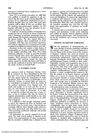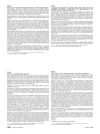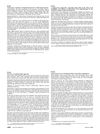 September 2016 in “Más dermatología”
September 2016 in “Más dermatología” New factors in female hair loss include genetics, hormones, stress, and inflammation; future treatments should also focus on these areas and consider the patient's emotional well-being.
 January 2017 in “DOAJ (DOAJ: Directory of Open Access Journals)”
January 2017 in “DOAJ (DOAJ: Directory of Open Access Journals)” Hair loss from alopecia areata and androgenetic alopecia moderately affects the quality of life, especially in younger patients and those with long-term hair loss, impacting both their physical and emotional well-being.
[object Object]  January 2007 in “Revista del Centro Dermatológico Pascua”
January 2007 in “Revista del Centro Dermatológico Pascua” Hair loss in women, often not related to male hormones, increases with age and can cause significant emotional distress.
 2 citations,
March 2004 in “Reviews in Gynaecological Practice”
2 citations,
March 2004 in “Reviews in Gynaecological Practice” Hormonal changes and psychological issues can cause sexual dysfunction in postmenopausal women. Behavioral therapy is recommended first, with hormone replacement helping some symptoms but not libido. Testosterone can improve libido, but its effects on overall sexual function are unclear. Emotional and relationship issues should be addressed before using medication, and the benefits and risks of testosterone supplementation should be considered.
 185 citations,
August 2005 in “Autoimmunity Reviews”
185 citations,
August 2005 in “Autoimmunity Reviews” Alopecia areata is an autoimmune condition causing hair loss due to the immune system attacking hair follicles, often influenced by genetics and stress.
 40 citations,
February 2013 in “American Journal of Clinical Dermatology”
40 citations,
February 2013 in “American Journal of Clinical Dermatology” People with hair loss feel more depressed and anxious, especially women, and need help managing emotions and beliefs about their condition.
 32 citations,
October 1999 in “Journal of women's health and gender-based medicine”
32 citations,
October 1999 in “Journal of women's health and gender-based medicine” Hair loss greatly affects women's mental health and appearance satisfaction.
 32 citations,
January 1997 in “Dermatology”
32 citations,
January 1997 in “Dermatology” Telogen effluvium is a hair loss condition with acute cases resolving quickly and chronic cases potentially lasting longer, sometimes requiring treatment.
 31 citations,
November 2000 in “Clinical and Experimental Dermatology”
31 citations,
November 2000 in “Clinical and Experimental Dermatology” WAA-QOL measures impact of hair loss on women's well-being.
22 citations,
December 2011 in “British journal of dermatology/British journal of dermatology, Supplement” Over 40% of women have unwanted facial hair, which can affect their self-image, and should be managed with personalized treatment and support.
 13 citations,
May 1993 in “International Journal of Dermatology”
13 citations,
May 1993 in “International Journal of Dermatology” The paper suggests that telogen effluvium, a type of hair loss, may be a long-lasting condition triggered by stress or illness in people whose hair growth is unusually synchronized.
 9 citations,
March 2018 in “Actas Dermo-Sifiliográficas”
9 citations,
March 2018 in “Actas Dermo-Sifiliográficas” The Spanish version of the Hair Specific Skindex-29 scale is a reliable and valid way to measure the impact of hair loss on women's quality of life.
 7 citations,
September 2021 in “Anais Brasileiros De Dermatologia”
7 citations,
September 2021 in “Anais Brasileiros De Dermatologia” COVID-19 can cause temporary hair loss, often starting around 7-8 weeks after recovery, with factors like Vitamin D deficiency, other diseases, medication, and stress potentially contributing.
 5 citations,
February 2014 in “PubMed”
5 citations,
February 2014 in “PubMed” Hair loss in Telogen effluvium is often chronic, linked to stress, and lacks a confirmed treatment, but topical corticosteroids may be used.
 4 citations,
December 2020 in “Neuropsychiatric Disease and Treatment”
4 citations,
December 2020 in “Neuropsychiatric Disease and Treatment” Women with skin conditions who have body image concerns often experience mental health issues and a lower quality of life.
4 citations,
January 2020 in “Indian dermatology online journal” Lichen simplex chronicus on the scalp can be diagnosed by specific hair and skin signs and treated with corticosteroids and therapy.
 2 citations,
July 2023 in “Frontiers in Endocrinology”
2 citations,
July 2023 in “Frontiers in Endocrinology” The review found that current care models for PCOS are not fully effective and more research is needed, especially in low-income countries.
 2 citations,
April 2021 in “Cureus”
2 citations,
April 2021 in “Cureus” Two new reliable Arabic questionnaires for measuring quality of life in women with PCOS were created, one for married and one for unmarried women.
 1 citations,
March 2023 in “Nutrients”
1 citations,
March 2023 in “Nutrients” The conclusion is that obesity should be managed with a slow, balanced approach to diet and exercise, with medication and surgery as additional options, and education and access to care are important.
1 citations,
January 2022 in “Dermatology Research and Practice” Androgenetic alopecia negatively affects self-esteem and daily stress, especially in young men.
 1 citations,
June 2007 in “Journal of Oral and Maxillofacial Surgery”
1 citations,
June 2007 in “Journal of Oral and Maxillofacial Surgery” A woman experienced temporary hair loss after jaw surgery due to the stress of the operation.
 1 citations,
November 1963 in “JAMA”
1 citations,
November 1963 in “JAMA” Timely diagnosis and active treatment improve outcomes for massive pulmonary embolism.
 February 2024 in “Recima21”
February 2024 in “Recima21” Covid-19 can cause hair loss due to immune and psychological factors.
 October 2022 in “Pediatric Dermatology”
October 2022 in “Pediatric Dermatology” Most children with rapid hair loss had a known cause, with stress and illness being top triggers, and treatments showed similar improvement.
 October 2022 in “Research, Society and Development”
October 2022 in “Research, Society and Development” Hair loss is a symptom of long COVID and can be treated with a protein-rich diet.
 June 2022 in “Research, Society and Development”
June 2022 in “Research, Society and Development” COVID-19 may cause increased hair loss, but the exact reason is unclear and standard hair loss treatments are recommended.
 May 2018 in “Actas Dermo-Sifiliográficas”
May 2018 in “Actas Dermo-Sifiliográficas” The Spanish version of the Hair Specific Skindex-29 is a reliable tool for measuring quality of life in Spanish-speaking women with hair loss.
January 2015 in “Rawal Medical Journal” Telogen effluvium is the main cause of hair loss in women in Karak, followed by androgenetic alopecia.
[object Object]  January 2008 in “Journal of The American Academy of Dermatology”
January 2008 in “Journal of The American Academy of Dermatology” Hair loss affects 20% of people, more in men and those over 35, and is often associated with a sensitive scalp.
 January 2008 in “Journal of The American Academy of Dermatology”
January 2008 in “Journal of The American Academy of Dermatology” A nonchemical lotion was found effective in killing head lice and their eggs in most people, indicating it could be useful for managing head lice.

























